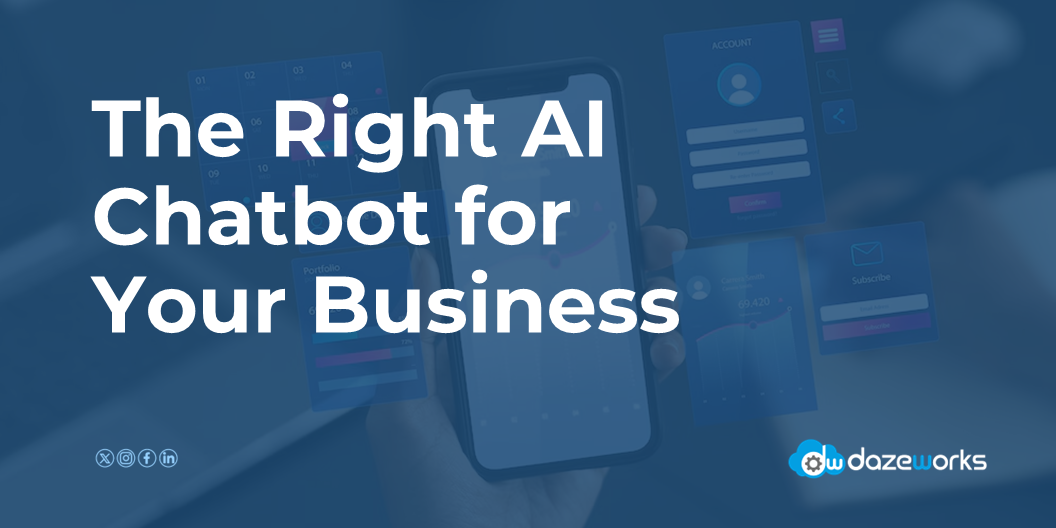
Choosing the Right AI Chatbot for Your Business
minutes read
As businesses increasingly turn to digital solutions to enhance customer engagement and streamline operations, AI chatbots have emerged as a popular and effective tool. These chatbots can handle a variety of tasks, from answering customer queries to automating repetitive processes. However, with numerous options available, choosing the right AI chatbot for your business can be a daunting task. This guide aims to simplify the decision-making process by outlining key considerations and features to look for in a chatbot solution.
Understanding AI Chatbots
An AI chatbot is a software application that uses artificial intelligence to interact with users, providing information, services, or support. Unlike traditional rule-based chatbots, AI chatbots use natural language processing (NLP) and machine learning algorithms to understand and respond to user inputs more accurately and contextually.
Why do Businesses Use AI Chatbots?
- Customer Service: AI chatbots can provide instant responses to customer inquiries, reducing wait times and improving satisfaction.
- Sales and Marketing: Chatbots can assist in lead generation, product recommendations, and even completing transactions.
- Internal Support: They can be used within an organization to assist employees with HR-related queries, IT support, and other services.
- Cost Efficiency: Automating routine tasks with chatbots can significantly reduce operational costs.
Key Considerations for Choosing an AI Chatbot
Purpose and Use Case
Identify the primary use case for your chatbot. Is it for customer support, sales, internal support, or a combination of these? The chatbot’s functionality should align with your business objectives and user needs.
Natural Language Processing (NLP) Capabilities
The effectiveness of a chatbot largely depends on its ability to understand and process natural language. Look for a solution with advanced NLP capabilities that can comprehend context, handle multiple languages, and recognize various dialects or accents.
Integration with Existing Systems
Ensure that the chatbot can seamlessly integrate with your existing systems, such as CRM software, e-commerce platforms, or customer support systems. This integration is crucial for providing personalized and efficient responses.
Customization and Flexibility
A good chatbot solution should allow for customization to fit your brand’s voice and tone. It should also be flexible enough to adapt to evolving business needs and incorporate new functionalities over time.
Scalability
As your business grows, your chatbot should be able to handle increased traffic and more complex interactions. Choose a solution that can scale without compromising performance.
Security and Privacy
Since chatbots often handle sensitive information, it’s essential to choose a solution with robust security measures. Look for features like data encryption, secure authentication, and compliance with regulations such as GDPR.
Analytics and Reporting
Analytics capabilities are crucial for measuring the effectiveness of your chatbot. The solution should provide detailed reports on user interactions, satisfaction levels, and other key metrics to help you continually improve the service.
Cost
Evaluate the cost structure of different chatbot solutions. Consider factors like subscription fees, setup costs, and potential charges for additional features or user volumes. It’s important to balance cost with the value and benefits the chatbot provides.
Types of AI Chatbots
- Scripted Chatbots: These follow predefined scripts and are best suited for simple, straightforward queries.
- Contextual Chatbots: These use machine learning and NLP to understand context, enabling them to handle more complex interactions.
- Hybrid Chatbots: Combining elements of scripted and contextual chatbots, these can handle a range of interactions and escalate to human agents when necessary.
Conclusion
Choosing the right AI chatbot for your business involves a careful evaluation of your specific needs, the chatbot’s capabilities, and how well it integrates with your existing systems. By considering factors such as NLP capabilities, customization options, security features, and cost, you can select a solution that not only meets your current requirements but also supports your business as it grows.
